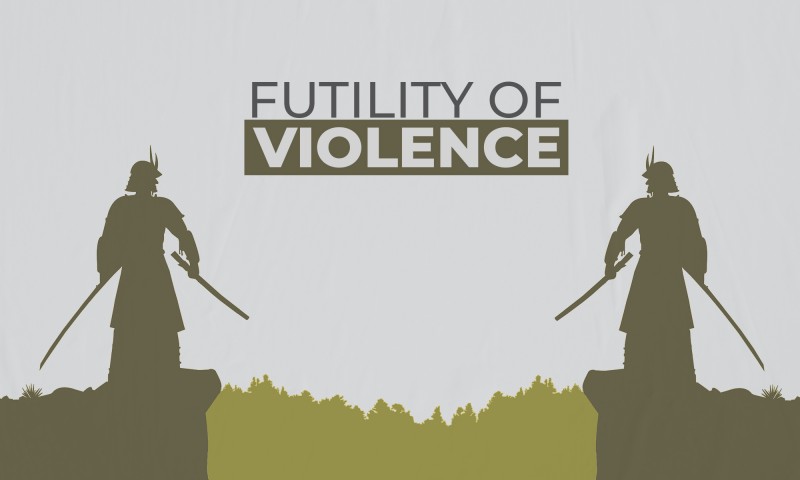The Shakyas and their neighbours, the Kolis, were just about to fight. A river ran between their two cities and people on both sides needed its water to raise crops in their fields. A dam had been built, so that everyone got enough water. But then, a severe drought came and the water almost dried up. There was very little left and both sides claimed that the water was theirs. The Shakyas and the Kolis in the area started calling each other bad names and cursing one another as well. Soon the princes of both countries heard of the dispute, and, of course, the stories told made things look much worse than they really were. As a result, the princes were outraged. They both called their armies to battle.
The Shakya and the Koli soldiers marched to the river, facing each other. Though far away (physically), Buddha foresaw that the war was just about to begin. So, he projected himself through the sky and materialized in the battleground. When they saw him, the Shakyas cast down their swords, for they honoured Buddha as the jewel of their people. The Kolis did as well. In a light vein, Buddha asked them, since they were gathered at the river, "Have you come to celebrate a water festival?" "No", they told him, "we came to fight." Buddha asked what caused them to fight. The princes were not really sure; so, they asked the generals, who were not sure themselves. The generals in turn asked the other officers and no one really knew until the farmers of the land told Buddha, "We're fighting for this water." Buddha asked them, then, what holds more value- water or men? They said that the value of water was very little, but the value of men was very great indeed. "Why, then, do you prepare to fight and waste the greater for the lesser", Buddha enquired.
Buddha simply urged them to ponder over: ‘Of what use would be the object of their fight when none would remain to claim it?’ The Shakyas and the Kolis realised that in times of crises, unity and strength is much greater than fighting and losing lives over things that are temporary and have no lasting value. Thus, they called off the war.
This Buddhist tale raises the issue of unity and peace. This is the subject that people of the contemporary world are fully familiar with, due to its pressing need all across the world. Although we are all familiar with this concept, yet we need to turn it into a practice by one and all.
The tale is a befitting reminder to all of us that disputes and rivalries develop over a certain object. In this tale, it was over river water. Even so, when we look at current world scenario, we are able to witness many a violent activities taking place all across the globe over certain material objects; such as, land. They begin under certain circumstances and, then, are heightened by selfish people, who, under the influence of their ego, are outraged and lead others also towards war and violence.
The story inspires man to pause and ponder over the value of the object that he fights for, as compared to the cost of lives that are involved in the struggle. Buddha demonstrates in this tale the importance of human life. He explains that every material object is transitory. It is part of this phenomenal world, which is going to end at one point. So, generally, the worth of the object sought to be achieved is much less than the cost involved in its attainment. And in cases where it is at the cost of human life, it is definitely not worth it.
History teaches us that it is not war but peace that we must prepare for. And peace can only be established by those who have a mind that is awakened and aware of that which is NOT transitory, but eternal.
Words will not suffice. An intellectual understanding of peace will not change the man who is bent on destruction; only the experience of eternal Truth will.
Get such Inspiring Articles, Soulful Stories, Thought Provoking Facts and much more... at www.djjs.org/akhandgyan


Gautam Buddha was an apostle of peace so he came forth with a point which made both the sides realise the futility of fight over a petty thing like water, though today, water is more valuable than milk. It is a general tendency of human beings to make a big prestige issue of a little thing. Greater interest is always preserved at the cost of the smaller one. While building roads, bridges and other public constructions individual properties like land are taken for the sake of collective interests. Today, trend has a bit reversed. A cow is preferred over man. Protection of cows is more important than the protection of man. Man is supreme. It can never be sacrificed at the altar of any religious belief. Material gains can be achieved later but the loss of human life for material gain is irrecoverable.